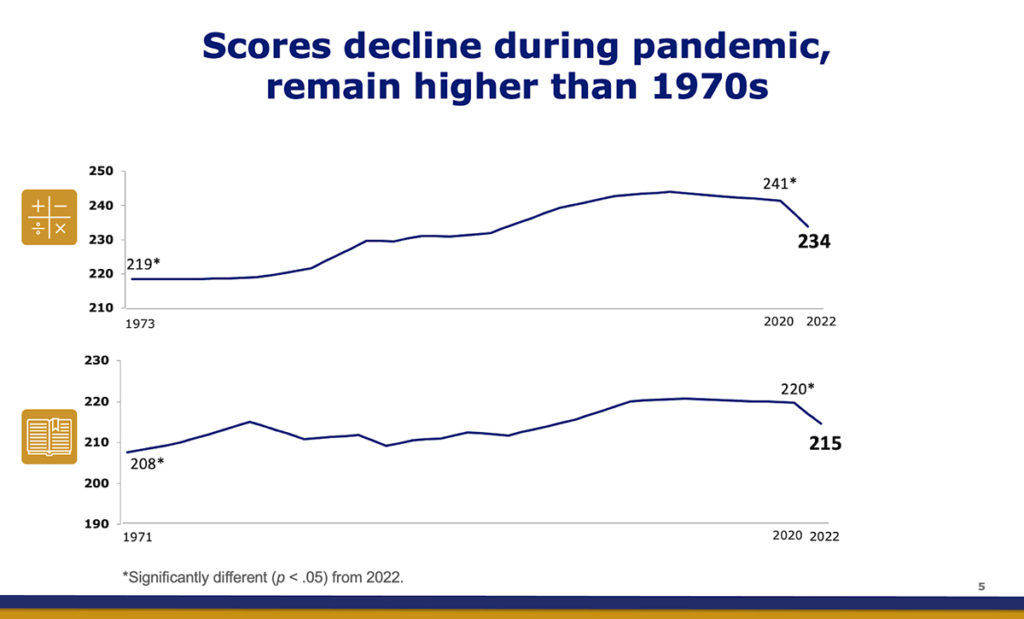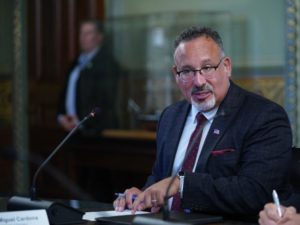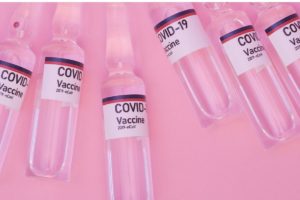Today the National Assessment for Educational Progress, or NAEP, released test scores for fourth-graders, mostly nine years old, and they are grim: math scores dropped seven points from 2020-2022, marking a first-ever decline, while reading scores slipped five points,the largest dip in 30 years. The losses were greatest for Black and Brown students, according to the test often referred to as “the Nation’s Report Card” and the “gold standard” for measuring student learning. Aaron Pallas of Columbia University told the Wall Street Journal, “I don’t think we can expect to see these 9-year-olds catch up by the time they leave high school,” he said, referring to the lower-performing students. “This is not something that is going to disappear quickly.”
This administration of these tests was to measure reading and math achievement during the COVID-19 pandemic.
Dan Goldhaber told The 74, “the pandemic is reversing a long-term trend of narrowing achievement gaps. That’s particularly bad, to my mind.” (For a local example, see Newark, where internal testing correlates with NAEP results: only 9% of students in grades 2-8 met state expectations in math and only 11% met expectations in reading.) Goldhaber references the “urgency gap,” the difference between state and school district responses and student need, and suggests “dramatically lengthening the school year to implementing widespread one-to-one tutoring” in order to deal with the enormous scale of learning loss. Currently billions of dollars of COVID federal aid hasn’t been spent by school districts a year after they got it.
NAEP tests are given to representative groups of students in fourth, eighth grades, and twelfth grades, primarily in math and reading. Later in the Fall NAEP will release complete results, with individual state report cards and more detail on subgroups.
Twitter is on fire with commentary, with much criticism of unnecessary school closures that generated this degree of learning loss. Here’s a sampling:
The 44-year history of the 90th-10th percentile achievement gap on the long term trend NAEP, 9 year olds in math. Starts out huge, narrows into the 1990s, stays flat until 2008, then begins to widen. Blows out in 2020-2022. pic.twitter.com/G41J7qMOUM
— Tom Loveless (@tomloveless99) September 1, 2022
The harm, politics, and payoffs of the last two years will be with us for the next 20. https://t.co/etebwFr2oP
— Derrell Bradford (@Dyrnwyn) September 1, 2022
BREAKING: First post-COVID NAEP scores show widespread losses in reading and math during the pandemic https://t.co/LRTkGY7Qlb
— The 74 (@The74) September 1, 2022
HARD WON GAINS AFTER NCLB WIPED OUT by stagnation of 2010s and mediocre response to COVID! @CharlesBarone @arotherham @EdTrust @texasinsider @EdTrust @EducationNext @ColleenDippel @Eduflack pic.twitter.com/6SREBwLVEu
— Sandy Kress (@Kress_Sandy) September 1, 2022
NYT headline fail. “The pandemic” didn’t erase two decade of student achievement results. Our leaders did by keeping schools closed.
(And the NYT times contributed by stoking unnecessary fear of returning kids to in-person learning.) pic.twitter.com/zAaFwrHUdO
— Marc Porter Magee 🎓 (@marcportermagee) September 1, 2022
Meanwhile, we're still arguing about whether it's OK to even call it learning loss or if some other term is better. https://t.co/Qyr8kmV4Jc
— Andrew Rotherham (@arotherham) September 1, 2022
Disappointed that @POTUS and @usedgov tried to bury this information via a late summer release. Key quote: “It erased the progress, and it exacerbated the inequality,” Dr. Ho said. “Now we have our work cut out for us.” https://t.co/ZZpvSyvROS
— Kyle Rosenkrans (@KyleRosenkrans) September 1, 2022
This is the first authoritative national account of academic learning loss from 2020 to 2022. It is a story of exacerbated inequality of educational opportunity.
It should inspire us not only to invest but invest where we need it most.
I'll add 3 measurement tangents in a 🧵 1/ https://t.co/80jhScqAJO
— Andrew Ho (@AndrewDeanHo) September 1, 2022
We can fix this but it will take more than what we are currently doing. Much more. https://t.co/T2jEkhkYk4
— Robin Lake (@RbnLake) September 1, 2022




